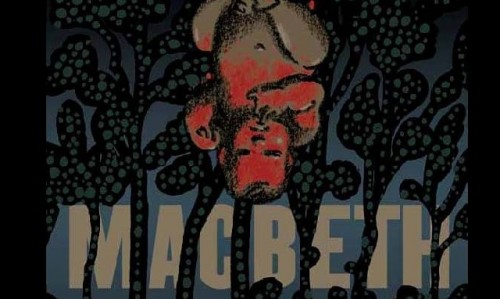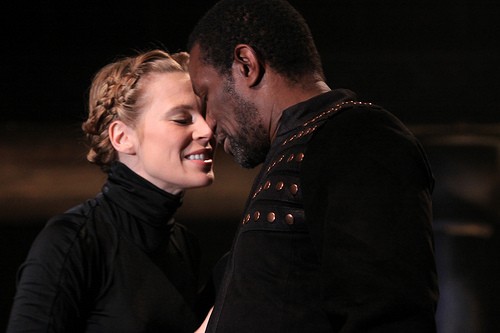TFANA’s Grisaille Macbeth
Arin Arbus Directs John Douglas Thompson and Annika Boras
By: Charles Giuliano - Mar 29, 2011
Macbeth
By William Shakespeare
John Douglas Thompson as Macbeth Annika Boras as Lady Macbeth
Directed by Arin Arbus
Theatre for a New Audience
http://www.tfana.org/
Duke Theatre on 42nd Street
Previews start March 12, opens March 20, through April 20
Cast: Justin Blanchard (Malcolm), Annika Boras (Lady Macbeth), Denis Butkus (Lennox), Peter Jay Fernandez (Duncan, Old Man, Doctor), Ian Holcomb (Donalbain/ Messenger), Albert Jones (Macduff), John Christopher Jones (Porter/Servant), Robert Langdon Lloyd (Ross), Saxon Palmer (Witch/ Seyton), Marquis Rodriguez (Fleance/Young Macdff/Young Siward), Roslyn Ruff (Lady Macduff/ Gentlewoman), Christian Rummel (Sergeant/English Doctor/ Mentieth), Tommy Schrider (Witch/ Murderer), John Douglas Thompson (Macbeth), Graham Winton (Banquo/ Siward), Andrew Zimmerman (Witch/ Murderer)
Scenic & Puppet Design: Julian Crouch
Lighting Design: Marcus Doshi
Costume Design: Anita Yavich
Sound Design: Sarah Pickett
Running Time: 2 hours, 30 minutes with an intermission
From the dark and ominous set of Julian Crouch, to the earthy, ersatz medieval tunics and armor in the costumes of Anita Yavich, and the stark lighting design of Marcus Doshi , this production of Macbeth evokes the tonal range of Duke Ellington’s moody, bluesy and somber “Black, Brown and Beige.”
With an emphasis on clarity of language, naturalism of delivery, and understated restraint Arin Arbus has delivered a more plausible and less exotic, spooky, gory reading than is the norm for Macbeth. The pervasive darkness, indeed perpetual night, results in a performance notable for its low chroma and vocal pitch that is dominantly in the lower register. Reaching beyond directing Arbus has painted a grisaille study of the grim and psychologically harrowing Scottish Play and seemingly conducted the vocal and emotional arc of a superb and finely tuned cast.
The exotic, supernatural element of witchcraft, hallucinations, and guilt driven dissolution of the psyche has resulted in many over the top interpretations. The most influential of these was the 1936 Orson Welles production set in Haiti with an African American cast and African drumming. That interpretation of The Voo-du Macbeth drew comparisons to The Emperor Jones by Eugene O’Neill. Since then there have been Hispanic versions with Raul Julia in the starring role, the Samurai Macbeth, Throne of Blood, of Akira Kurosawa, an Inuit translation and cast, and even rap/ hip hop takes on the play.
There are no such liberties in the Arbus interpretation of Macbeth which focuses on a meticulous reading of the text. She makes a compelling case for the humanity, tragic flaws, and harrowing reversal of a loving couple undone by ambition that led to regicide and multiple homicides.
The sense that we are experiencing a very different Macbeth occurs early on when he (John Douglas Thompson) and Banquo (Graham Winton) encounter the weird sisters. They are three scruffy creatures in loose, homespun, rough tunics revealing just a hint of breasts. There is none of the usual cackle as their interaction, and the shattering impact on Macbeth and Banquo, is almost conversational. The lines of Saxon Palmer, Tommy Schrider, and Andrew Zimmerman are delivered with seemingly no malice or irony. That places the emphasis on how Macbeth and Banquo absorb, believe and act upon the prophesy.
During the later, boil and bubble, encounter with the witches there is an avoidance of a signifying cauldron with the requisite, dry ice, smoke. Instead the concoction is created literally below deck, sight unseen. The three hags offer up ladles of the strange brew. Making Macbeth more of a participant in the dark arts. But he presses them to know more from their master, Hecate. The signifier of the dark side does not appear in this production but has prominently, as a narrator, in others. In the Arbus take on Macbeth the mojo may just be a figment of his fertile imagination. By not solving the riddle of the oracles Macbeth, like Oedipus, is damned to a grim end.
The understated interaction with the witches makes us wonder just when the plot to murder Duncan and seize the throne first occurs to Macbeth. Based on his heroic action on the field of battle, and subsequent honor as the anointed Thane of Cawdor, he has every reason to believe that the council of Thanes will name him as successor to Duncan. In his mind he has earned that right. But then Duncan (Peter Jay Fernandez) defies Scottish royal tradition by naming his son Malcolm (Justin Blanchard) as heir to the throne.
In the Arbus interpretation the prophesy of the witches is less a motive and impetus for the actions of the Macbeths than a confirmation of their assumptions. This is not the beginning of their ambitions for the throne. We sense that it has been there all along. They are now caught up in circumstances that force them to morbid action. Through the serendipity of having Duncan as a guest in their castle they must seize the moment.
The unique approach of this production focuses on the loving relationship and sensuality of the Macbeths. It has been the norm to present Lady Macbeth (Annika Boras) as an evil, scheming shrew who wears the pants in the family. Her strength and resolve is often played against his weakness and vacillation. Even though they are involved in horrendous crimes this production allows us to identify with their humanity, folly, and the tragic consequence of their crimes.
To make this work requires a remarkably unique and galvanic Lady Macbeth. On every level Boras is just sensational. Yavich has poured her into a slithering, body clinging, tube of black accented by her striking blonde hair tightly braided. Her tall, slender body is a lightning rod of emotional synergy with the rugged, battle tested machismo of Thompson.
When they first meet during his return to the castle she leaps up and clings to him as they embrace. It’s a steamy and joyous moment that conveys their passion and sexuality. Later, when he wavers in his resolve of their pact to seize the throne, we learn that they have lost a child. In a tragic conflation that loss as a couple seals their bond and ambition for the throne. Our empathy for their loss is balanced against abhorrence for the subsequent blood bath.
Over the past few seasons we have experienced Thompson taking on some of the most challenging leading roles in the canon- Othello, Richard III, Marc Antony and now Macbeth. Add to that his commanding performance as The Emperor Jones. Having seen him as these characters we are drawn to find similarities and differences in the performances. What is always compelling, and no less so with Macbeth, is the meticulous study and preparation that allows for penetration into the depth and flaws of the characters. It is interesting to note that all of these proud, virile, and ambitious men commit suicide or are murdered as the result of their deeds.
A great leading actor, like Thompson, has the ability to bring out the best in other players. That is very evident in this production. The chemistry with Boras was riveting but overall there were many triumphs and personal bests with a superb cast.
Of particular note was the Macduff of Albert Jones. To live to fight another day he has fled but abandoned his family to the wrath of Macbeth. When Macduff learns of their slaughter we are deeply moved as through guilt and horror he doubles over and internalizes the loss. This approach masterfully allowed us to grasp the complexity and anguish of his grief. It also sets up the fury of revenge when in the resolution of the play he crosses swords and kills Macbeth (off stage).
In notable contrast to the understated grief of Macduff the performance of Roslyn Ruff (Lady Macduff) is out of sync and overplayed. Her dialogue with their son is too high pitched and accusatory. She reaches a register above the modulated other players. This devolves into screeching when she is assaulted and murdered by the witches, now transformed by masks, into three assassins.
Yes there is a lot of blood in Macbeth. Rivers of it. But unlike the Roman Polanski version we never get to see the actual slaughter. There are bloody daggers and of course the carnadined hands and besmirched faces.
In Aristotle’s Poetics one of the defining elements of tragedy is reversal. Fresh from the triumph of the battle field we know that Macbeth is a great warrior. Killing is the means that has earned him power and honor. Why then his hesitation about the murder of Duncan? Having met and been spooked by the witches there is the apparition of the dagger. It unhinges his resolve as Macbeth reveals misgivings to his wife. By pushing him into action she appears to be the stronger of the two. To fix the mess she will return the daggers and smear the attendants with Duncan’s blood.
In the banquet scene Macbeth has lost it over the ghost of Banquo. Only he can see the bloody victim. It is Lady Macbeth who attempts to calm him and mollify the guests. But that proves to be the apogee of her scheming and sanity.
Her descent into madness was portrayed brilliantly. There is a black and white, day and night reversal. For the “Out damned spot” scene she appears with her hair down, a metaphor for having lost control. Instead of the black sheathe she is costumed in a loose white nightgown. In a stunning performance Boras evokes empathy for her forlorn demise. Rather than condemn Lady Macbeth for her crimes the actress has allowed us to feel her remorse, desperation and anguish.
In the final scene, just as he is about to meet his own fate, Macbeth learns of the suicide of his wife. His remarkable response is one of the great soliloquies in the canon. Macbeth’s metaphor on life and death evokes comparisons to Hamlet’s “To be or not to be.”
The moment allows Thompson to deliver the full measure of Macbeth’s conundrum, ennui, loss and vulnerability. Again, he was remarkably measured and low key allowing the words to resonate through us as he stated
“To-morrow, and to-morrow, and to-morrow,
Creeps in this petty pace from day to day,
To the last syllable of recorded time;
And all our yesterdays have lighted fools
The way to dusty death. Out, out, brief candle!
Life's but a walking shadow, a poor player,
That struts and frets his hour upon the stage,
And then is heard no more. It is a tale
told by an idiot, full of sound and fury,
Signifying nothing.”
It creates an interesting tension and parallel with Malcolm’s lines, at the beginning of the play, about the execution of a traitor the Thane of Cawdor.
“They are not yet come back. But I have spoke
With one that saw him die; who did report
That very frankly he confessed his treasons,
Implor'd your Highness' pardon, and set forth
A deep repentance. Nothing in his life
Became him like the leaving it.”
It is for grim insights such as these that Macbeth endures as one of the greatest of Shakespeare’s plays. And why so many peoples and cultures have embraced its complexity and humanity. It is full of metaphors that resonate and are always with us. Indeed it could be conflated today with the tragic endgame now playing out in Libya.
Consider an Arabic production of Macbeth with a deranged Muammar Muhammad al-Gaddafi channeling the regicidal, maniacal Thane of Cawdor. There is a commonality of evil, murder and ambition that sweeps across centuries from Scotland to the here and now. As long as there are brilliant and gifted players like Thompson and Boras who allow us to burrow deeply into their hearts of darkness.
To sleep: perchance to dream: ay, there's the rub; For in that sleep of death what dreams may come.





